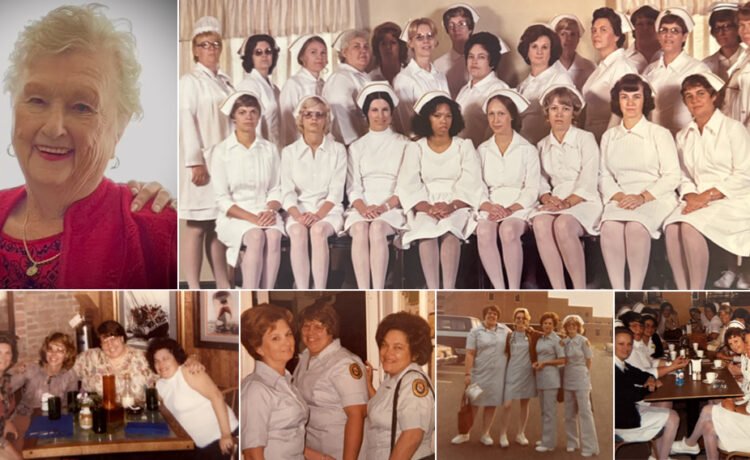
LA PLATA, Md. – The College of Southern Maryland (CSM) recently received extraordinary gifts from the estate of CSM alumna Margaret Mary Hampton as overseen by her daughter Carol Zadeh, of Waldorf. Hampton passed away in February and was among the very first Charles County Community College (former CSM) nursing graduation class, even serving as the student representative commencement speaker.
Among the treasured items donated to CSM are:
- A program from the Charles County Community College Department of Nursing’s first graduation ceremony, held Aug. 16, 1976, listing the names of the 20 women who comprised that inaugural class.
- A blue examination booklet with a hand-written case study of a nine-year-old asthmatic child born in 1967, marked with an “A” grade.
- A nursing cap– called the “Flossie” in honor of Florence Nightingale – covered with notes from friends. “To a great person who’s also a great nurse. Best wishes for the future!”
- Dozens of photos that show comradery, studying, and practicing nursing
The newly donated items provide an intimate window into what it was like to be a member of CSM’s first class of nursing students. Hampton’s story, though it took place nearly 50 years ago, reflects the familiar path of many CSM’s returning learners: after years of caring for her family, Hampton returned to school at the age of 40 to begin her career outside the house.
“Mom was a caregiver long before she was a nurse,” said Zadeh. “She had raised her children, volunteered at her church and was a homemaker and excellent wife and mother. She cared for my grandmother – her mother-in-law – when she had thyroid cancer, and throughout the years she cared for other family members who came to live with us while they recovered from illness or accidents. She always thought it was important to help in any way she could.”
After Hampton returned to school in her 40’s, her husband, Leonard “Butch” Hampton, took over some of those caregiving duties, including helping care for Margaret’s mother after she suffered a stroke. Zadeh said she remembers there were some hiccups as everyone adjusted. Once, after Butch helped his mother-in-law to get ready for the day, the kids noticed that their grandmother’s smile seemed different – and began laughing hysterically when they realized that he had put her dentures in upside down.
Despite the shakeup to their home life, Zadeh said that her father was supportive of her mother’s career change, and that her mom excelled at school. As the oldest student in her class, Hampton took on a “mother” role to her classmates, organizing study groups and serving as the class representative. After graduation, Hampton enjoyed a long career as a nurse, working in nearly every local hospital before retiring from a position as a pediatric nurse at a private practice.
For the last several years of her life, Hampton suffered from dementia, but never lost her caregiving instinct. Zadeh said that her mom bonded with the assisted living medical technicians over their shared calling, and even helped prepare the medication for other patients by filling up water cups as the medical technicians made their rounds.
“Being a nurse was just part of who she was, she could never turn it off,” said Zadeh. Watching her mother’s assisted living caregivers as they learned her mom’s likes and dislikes, helped her with self-care, and formed true bonds – gave Zadeh a new appreciation for the impact her mother made on the people she, herself treated. Hampton even inspired her great niece, Maria, to become a nurse.
During her final hours Hampton remembered the nurses, asking to thank the medical staff at Georgetown University Hospital for being so kind and compassionate to her.
Zadeh’s parents passed away within six months of each other after celebrating 64 years of marriage. Their bond remained strong until their final days: the night before entering the hospital for pneumonia, Hampton told Zadeh that she just wanted to go to heaven to be with her family. She told the concierge that she spoke to Butch that morning and he was coming to get her.
The Hamptons raised three children in their Waldorf home and witnessed their family legacy live on in subsequent generations. Their legacy continues to grow as their great-grandson celebrated his first birthday on the day Margaret passed away, and a great grand-daughter was born two days after her death; baby Molly was given the middle name of “Margaret” by Hampton’s grandson and his wife.
“As one person dies, another is born,” reflected Zadeh’s husband, Ralph.
And as for Hampton’s legacy, Zadeh is ensuring her contributions go beyond CSM. Hampton’s medical records were donated to science for use in future medical case studies, ensuring that, 50 years after she coordinated study groups for her CSM classmates, she will continue helping to train the next generation of nurses.
“She loved being a nurse and helping those in need and I am proud to say she is still helping after her death,” said Zadeh.
CSM Archives and Southern Maryland Studies Center Preserve Local History
“As soon as [Carol] contacted me, I knew that this was something we’d like to have in our archives,” said CSM Library Director Mary Johnson. “It’s important for CSM to be able to document the first class of the college’s nursing program.”

CSM is home to two regional archives: the CSM Archives, which holds items and documents related to the college’s history, and the Southern Maryland Studies Center (SMSC) archives, which collects and catalogues items related to the region. Both are located at the CSM Library on the La Plata Campus.
Ensuring that those generational connections stay alive is part of the mission of both sets of archives housed at CSM, Johnson said. Through her work with the SMSC, Johnson has helped people track down their family genealogy through old newspapers, hear their great-grand-parents voices on oral history recordings, and find photos of family members after their personal collections were lost.
“It is really heart-warming work sometimes,” Johnson said. She shared that the center makes a concerted effort, through community outreach and publicity, to make sure that they are including materials and stories from all the populations that have called Southern Maryland home, including Indigenous peoples and the Black community. “We’re always looking at ways to keep the collection moving forward. This isn’t just a representation of a certain group of people, but of the entire community.”
Although both archives are currently closed to the public, Johnson said she is able to fulfil requests to access materials on a case-by-case basis. And later this year, thanks to a $500,000 grant from the state of Maryland sponsored by the late Sen. Thomas V. “Mike” Miller in 2017, the SMSC archives will complete construction of a new home in the lower floor of the La Plata Campus library, complete with a dedicated in-house archivist, a state-of-the-art storage system, a separate HVAC system optimized for archival preservation, and a public-facing space where visitors can study materials.















